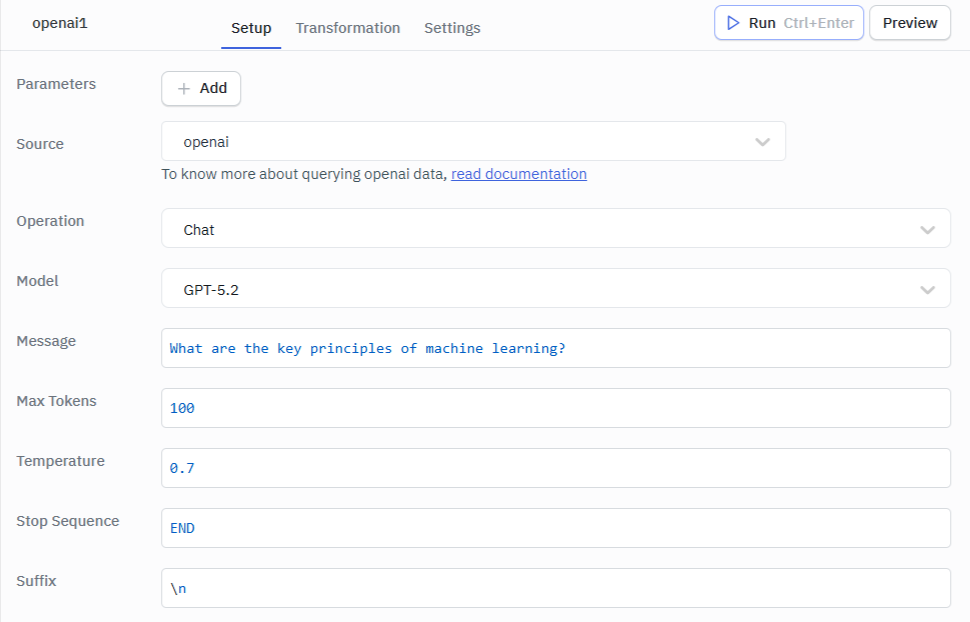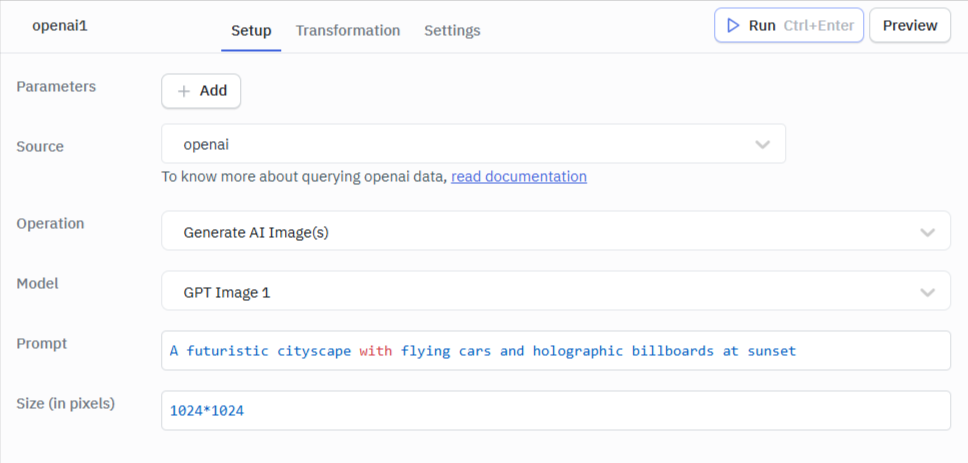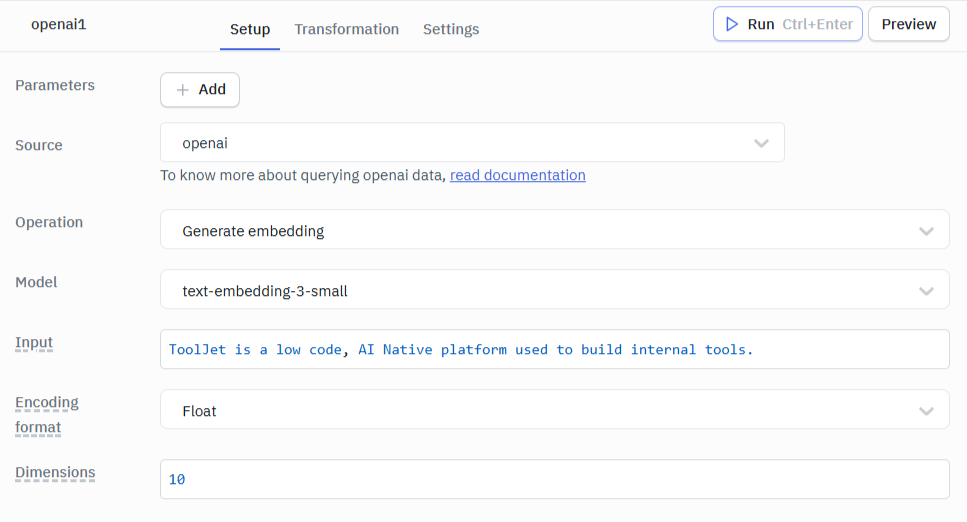OpenAI
ToolJet integrates with OpenAI to utilize its AI capabilities. This integration enables ToolJet to generate text based on user prompts, facilitate chat interactions, create images tailored to specific inputs, and generate vector embeddings.
Before following this guide, it is assumed that you have already completed the process of Using Marketplace plugins.
Connection
For connecting to OpenAI, the following credentials are required:

Supported Operations
Chat
The function of this operation is to examine the user's input and generate a suitable response that simulates human-like conversation.
Required Parameters
-
Model: The model to use for generating the chat response. The available models are:
- GPT-5.2
- GPT-5.1
- GPT-5
- GPT-5 Mini
- GPT-5 Nano
- o4 Mini
- o3
- o3 Mini
- o1
- GPT-4.1
- GPT-4.1 Mini
- GPT-4.1 Nano
- GPT-4
- GPT-4 Turbo
- GPT-4o
- GPT-4o Mini
- GPT-3.5 Turbo
-
Prompt: A prompt is the initial message or question that is provided as input to the chatbot model to start a conversation.
Optional Parameters
- Max Tokens: This parameter specifies the maximum number of tokens to generate in the text completion output. For example, if you set it to 50, then it will generate a text completion that contains up to 50 tokens.
- Temperature: Temperature is used to control the creativity and randomness of the generated text. It ranges from 0 to 2, a higher value such as 0.8 will increase the randomness of the output, whereas a lower value such as 0.2 will make it more focused and deterministic.
- Stop sequence: This Stop sequence/parameter is used to specify when the API should stop generating text completions. This parameter is optional and can be used to customize the length and quality of the generated text.
- Suffix: The suffix that follows the inserted text completion.

Example Values
Model: GPT-4 Turbo
Prompt: What are the key principles of machine learning?
Max Tokens: 100
Temperature: 0.7
Stop sequence: END
Suffix: \n
Response Example
"Machine learning, a subset of artificial intelligence, is fundamentally about designing and implementing algorithms that can learn from and make predictions or decisions based on data. The key principles of machine learning can be outlined as follows:nn1. **Learning from Data**: At its core, machine learning involves developing algorithms that can learn from and make predictions or inferences from data. Models are trained using a large set of data known as training data, which helps them make decisions or predictions without being explicitly programmed for the task.nn2"
Generate AI Image(s)
This operation generates AI images based on the given prompt.
Required Parameters
- Model: The model to use for generating the image. The available models are:
- GPT Image 1
- DALL-E 3
- DALL-E 2
- Prompt: The prompt is the initial message or question that is provided as input to the AI model to generate an image.
Optional Parameters
- Size (in pixels): The size of the image to be generated in pixels. The default value is 1024x1024. The allowed sizes depend on the model:
- GPT Image 1: Must be one of
1792x1024,1024x1792, or1024x1024. - DALL-E 2: Must be one of
256x256,512x512, or1024x1024. - DALL-E 3: Must be one of
1024x1024,1792x1024, or1024x1792.
- GPT Image 1: Must be one of

Example Values
Model: DALL-E 3
Prompt: A futuristic cityscape with flying cars and holographic billboards at sunset
Size(in pixels): 1024x1024
Response Example
{
"status": "success",
"message": "Image generated successfully",
"data": {
"url": "https://oaidalleapiprodscus.blob.core.windows.net/private/org-CpkCwFjT48kGZ33uOV2L4QxH/user-3QrXKnZO1PJUBeNP6xiQV9Rs/img-XXIds2QvTdcUfcJ2qmNWLwsC.png?st=2024-10-09T10%3A24%3A34Z&se=2024-10-09T12%3A24%3A34Z&sp=r&sv=2024-08-04&sr=b&rscd=inline&rsct=image/png&skoid=d505667d-d6c1-4a0a-bac7-5c84a87759f8&sktid=a48cca56-e6da-484e-a814-9c849652bcb3&skt=2024-10-09T03%3A29%3A32Z&ske=2024-10-10T03%3A29%3A32Z&sks=b&skv=2024-08-04&sig=qPBYkPdQjLwBWJAS8fWmhs3B5TNSYbxhuMe15NcmgM4%3D"
}
}
Generate Embedding
This operation is used to generate vector embeddings from the given text, which can be used to build AI applications.
Required Parameters
-
Model: The model to use for generating the vector embedding. The available models are:
- text-embedding-3-small
- text-embedding-3-large
- text-embedding-ada-002
-
Input: The text input used for generating the vector embedding.
Optional Parameters
- Encoding format: Specifies the output format of the vector embedding from the dropdown, float or base64.
- Dimensions: Defines the number of values in the generated embedding vector, affecting its size and level of detail.

Example Values
Model: text-embedding-3-large
Input: ToolJet is a low code platform used to build internal tools
Encoding format: Float
Dimensions: 10
Response Example
{
"embedding": [
-0.49750686, -0.7019393, -0.23043627, -0.12421317, -0.076866604, 0.2191516,
0.2548046, 0.1453106, -0.20050736, 0.10516006
]
}